Cape Fear
Directed by: J. Lee Thompson
Written by: James R. Webb, John D. MacDonald
Starring: Gregory Peck, Lori Martin, Polly Bergen, Robert Mitchum
HCF REWIND NO. 176: CAPE FEAR [US 1962]
AVAILABLE ON DVD AND BLU-RAY
RUNNING TIME: 100 min
REVIEWED BY: Dr Lenera, Official HCF Critic
After spending eight years in prison for rape, Max Cady is released. He promptly tracks down Sam Bowden, a Georgia lawyer whom he holds personally responsible for his conviction because Sam interrupted his attack and testified against him. Cady begins to stalk and subtly threaten Bowden’s family, and kills the Bowden family dog, though Sam cannot prove this. A friend of Bowden’s, police chief Mark Dutton, attempts to intervene on Bowden’s behalf, but cannot prove Cady guilty of any crime….
Cape Fear is an extremely tense and even rather scary suspense thriller that grabs you right from the beginning and only relaxes its grip around the middle for a short period, where perhaps a few minutes could have been cut, but then it may have been almost unbearable for it to keep up that sense of menace every moment. Pretty strong stuff for its time, it perhaps seems tame now, but its nasty element of sexual menace is still quite powerful. I’ve always loved stories where decent, law-abiding folk have to get down and dirty to deal with a menace, and this is one of the best because its hero seems about as law-abiding and upstanding as they come, an element strengthened by him being played by Gregory Peck in a part highly reminiscent of his Atticus Finch in To Kill A Mockingbird. Is it a classic? I would certainly call it a minor one, and its reputation has improved greatly since its release. Perhaps someone like Alfred Hitchcock, who was a clear influence on this movie, may have done an even better job than J. Lee. Thompson [Tiger Bay, The Guns Of Navarone] managed to achieve, but the film still succeeds in what it sets out to do – keep you uneasy and on the edge of your seat – and not nearly enough pictures achieve even that.
This film was based on a novel entitled The Executioners by John D. MacDonald, and the MPAA demanded that James R. Webb’s initial screenplay be altered to remove some uses of the world ‘rape’ and change the nasty Max Cady from being an ex-soldier because it reflected adversely on U.S. military personnel. What strange times they were, but Cape Fear would probably not have even been able to be made ten years before, at least in a recognisable form. Rod Steiger wanted to play Max Cady, but he backed off when he heard Robert Mitchum was considering the role. Telly Savalas was screen-tested for the role, but later played private eye Charlie Sievers. Charles Bronson, James Coburn, Charlon Heston, Jack Palance and even John Wayne were in the running for Sam Bowden and Heston was cast, but unspecified commitments led to him being replaced by Gregory Peck, whose production company Melville Productions was producing the film. Mitchum didn’t want to film on location in Savannah, Georgia, because he’d been charged with vagrancy there as a teenager and been put into a chain gang. If you look closely you’ll notice that some of the interior scenes are shot in the Psycho house! In the UK Cape Fear required around six minutes of censor cuts to avoid getting an ‘X’ rating, the problem being the “continuous threat of sexual assault on a child”. Most of Mitchum’s most threatening moments were removed and even some of his dialogue cut. The film was not a commercial success, something which always surprises me, and ended Melville Productions.
Cape Fear gets straight into it with no messing about, even the opening titles show Max walking through the town, having ended his eight year jail term, and into where lawyer Sam as in court. Max proceeds to harass Sam, and then his family, but doesn’t actually do anything illegal except kill a dog, which can’t be proven. Most of the time he just shows up, be it at a bowling alley or by the harbour, and either looks at or makes lewd comments about Sam’s wife and daughter to Sam. Mitchum is, in a word, brilliant. He’s extremely intimidating yet never goes over the top, and the actor also exploits his sexuality – I’ve read in several places how some women find this bad boy rather exciting and even attractive – and this is even after he beats up a loose woman, who says how pleased she is to have hit “rock-bottom” with him and can’t sink any lower, whom he picks up. We don’t see much of the act, just Max slowly walking towards her in her hotel room, topless, the expression on his face very subtly turning to one of evil, the woman suddenly realising something very nasty’s going to happen, then the camera cutting to outside the doors through which we can just about make out him hitting her. Something about the sight of a man battering a woman makes me queasy, so the way this scene is handled is more than enough in my opinion, especially considering it’s in what is meant to be a pulp thriller, a piece of popular entertainment.
Even after this, when the stakes seem even higher because we have seen more clearly what Max can do, he still holds back in doing anything to Sam for which he can be convicted of. Even during a very tense sequence when Sam’s daughter Nancy flees from him through her school, he isn’t really doing anything wrong. He doesn’t touch her or even threaten her. Much of the fascination of the story comes from Sam being the one who in the eyes of the law does wrong, and not just because we seem to live in a country where criminals often seem to have more rights than their victims. Sam makes explicit threats to Max, strikes him in full view of lots of people, and even sends three heavies to beat him up, only for Max to overpower all three of them. After this, there’s nothing left for Sam but to plan to trap Max himself, but of course it’s harder than expected. The pace, which up to now has been headlong, stalls a bit for a while as it sets up the final sequence of events, but the climax has some hair-raising moments. Max, whose motives are never entirely clear [though he tells a horrible story about “occupying” his wife], rubs eggs on Sam’s wife Peggy in a strikingly perverse moment which was not actually scripted, then virtually uses her as a battering ram to force open some locked doors which were actually supposed to be open. And in the final showdown between Max and Sam, a showdown where the excitement really has been ramped up and which ends in a different manner from the norm in these types of stories, you can see Peck hit Mitchum for real.
Thompson sometimes seems to be mimicking Hitchcock with his use of close-ups and particular angles. The feel is enhanced by Hitchcock’s favourite editor George Tomasini doing the cutting and a truly menacing score by Bernard Herrmann, an unrelenting musical exercise in piling on pressure. Meanwhile Sam Leavitt’s crisp black and white photography is a showcase in how to make the most out of the format. The use of shadows is stunning, most notably during a scene where Peggy wakes up one night and, hearing noises, wakes downstairs, the bars of various things in the house from banister beams to window panes falling across her face. It’s sometimes almost as good as John F. Sietz’s amazing work on Double Indemnity. I really don’t think this film would have worked nearly as well in colour, and certain glaring flaws may then have been more obvious, like having a film set in the American South but having no local colour whatsoever and the cast, except for Mitchum, mostly sounding like New Yorkers half-heartedly trying to play Southerners [though isn’t it great to see Telly Savalas with hair?!]. There is also a section of the film that is a little confusing, between Sam planning to trap Max and Max finding Peggy. It’s not exactly clear who is going where and doing what.
Peck was often a somewhat stiff actor, one of those people that was a star first and a performer second, but he sometimes used that to his advantage. He certainly does that here, then peels away the cracks in his righteous character. By the final scene, he has matched Mitchum, and that’s no mean feat when Mitchum is at the top of his game too [though he had played a similar role in The Night Of The Hunter]. Cape Fear just misses being a great movie, but it’s certainly a strong one that should work up most viewers into a bit of a sweat, and it also really demonstrates how implication can often be better than telling and showing everything. It was remade by Martin Scorsese in 1991. If you want to know what I think of it, there will be a review of it up soon!
Rating: 










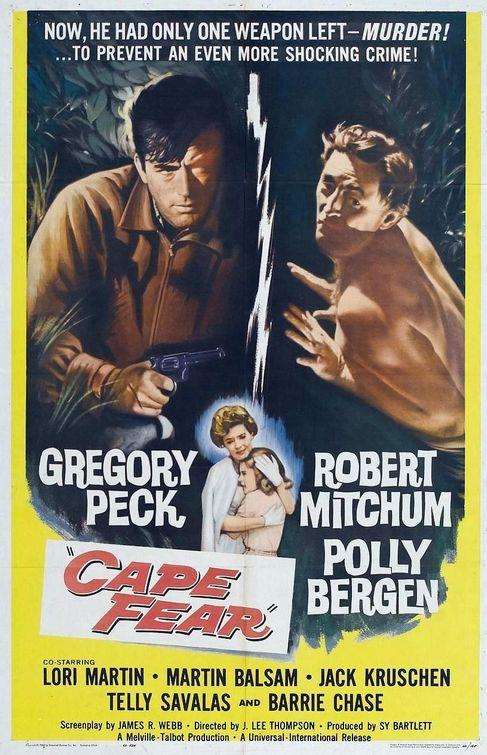
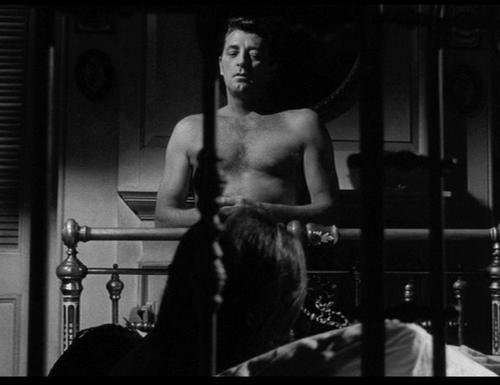
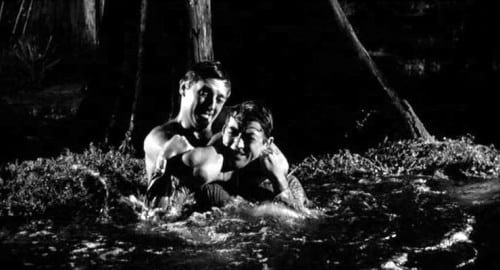


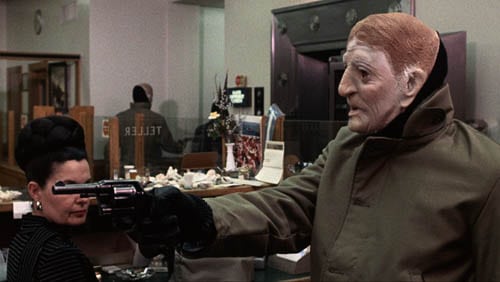
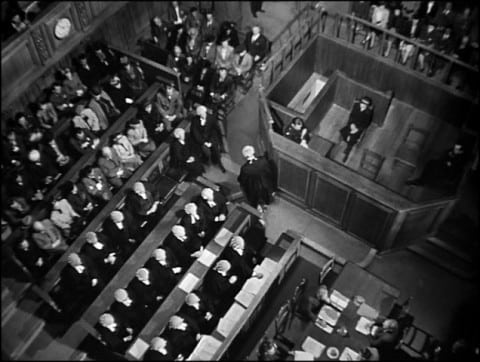
This is a very intelligent analysis of the film with lots of great background information. I really like your statement,”I’ve always loved stories where decent, law-abiding folk have to get down and dirty to deal with a menace.” Max Cady is a figure of menace, and I agree that Peck is often a bit stiff in his acting.
I wrote a short essay on the film, arguing that Max Cady is a psychopath. If you would like to read it, here is the link: https://christopherjohnlindsay.wordpress.com/2014/02/01/cape-fear/
Thankyou for your kind comments, it always feels good to get good feedback from something you’ve written, it really makes it worthwhile! I will definitely read your essay next time I log on, thanks for the link.